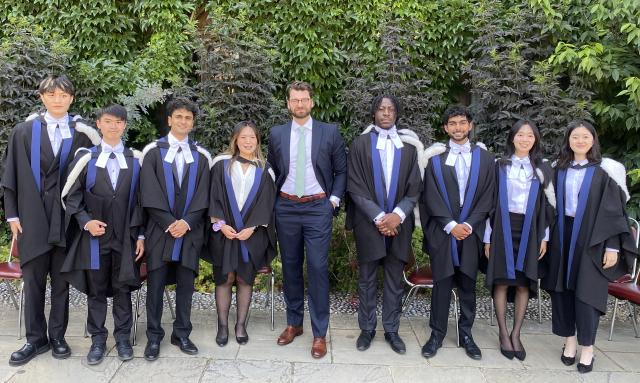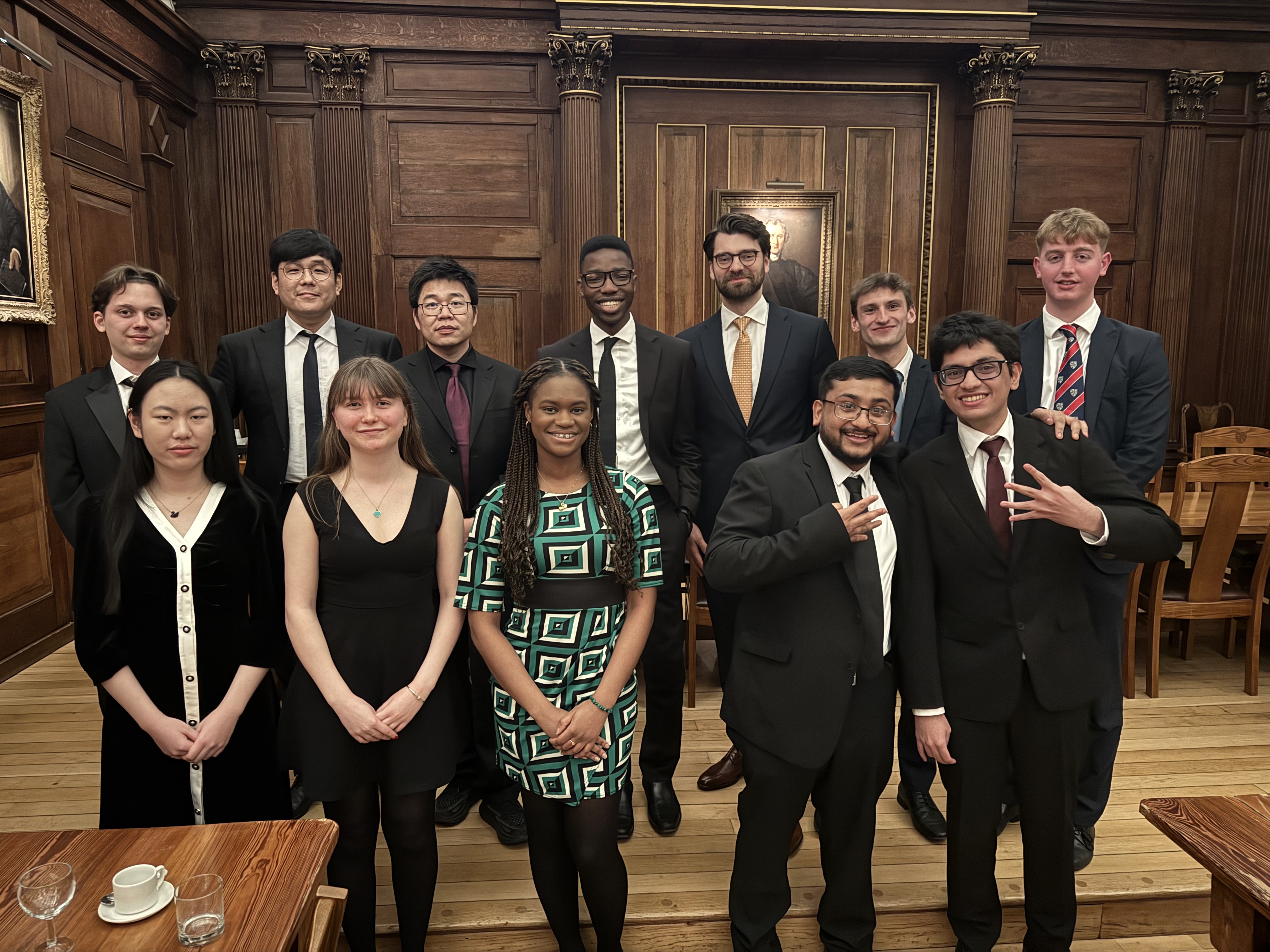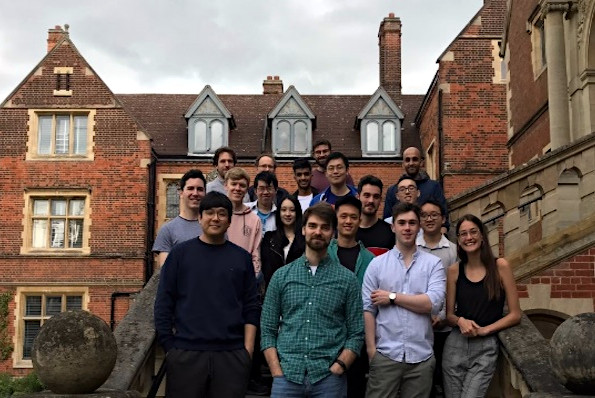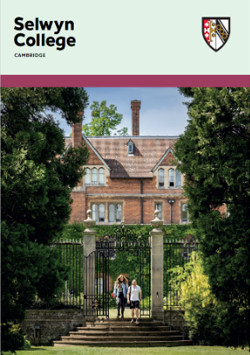Why study Economics at Selwyn College?
Rapidly growing Faculty
In recent years, we have significantly expanded our Economics faculty, nearly doubling the intake of undergraduate economists and increasing the number of economics fellows fivefold. With a typical cohort of 24 undergraduates, 8 master’s students, 4 PhD students, 10 fellows and lecturers, Selwyn now has one of the largest and most diverse economics communities among Cambridge colleges. Alongside this expansion, we have enhanced our teaching offerings, leading to notable improvements in our students' exam performance.
Diverse international community
As a Selwyn economics student, you will become a member of a truly global community, with current and recent members coming from places such as Austria, Australia, Bahrein, Belgium, Bangladesh, China, Denmark, England, France, Germany, Greece, Hong Kong, India, Italy, Iran, Lithuania, Malaysia, New Zealand, Northern Ireland, Oman, Poland, Russia, Singapore, South Korea, Sweden, USA and Wales.
Culture of academic excellence
Selwyn consistently ranks among the top two colleges for exam performance in Economics, with approximately 50% of our undergraduates earning First Class Honours. As a Selwyn economist, you will be part of a high-achieving environment that empowers students to excel, supported by world-class teaching and a strong academic culture that fosters ambition and drives success.
Outstanding teaching and mentorship
Selwyn boasts one of the largest Economics faculties at Cambridge, featuring some of the university's top lecturers and supervisors. Many of our fellows have received prestigious awards for their excellence and innovation in teaching. Unlike most colleges, we can support all our undergraduate teaching in-house. You will receive exceptional, personalised guidance from our fellows, who are deeply committed to helping you thrive and maximising your learning experience at Cambridge.
Award-winning innovative pedagogical approach
The academic success of our students is driven by an award-winning, student-centred, and evidence-based teaching approach pioneered by our fellows. This innovative approach, exclusive to Selwyn, sets us apart from other colleges. It promotes deep understanding, enhances long-term retention, and improves exam performance. Our distinctive teaching methods will enrich your learning experience, sharpening your quantitative and critical thinking skills, and empower you to reach your full academic potential.
Exclusive research opportunities
Every summer, several Selwyn Economics undergraduates are selected for a 10-week long paid research internship, working closely with one of the College’s Economics fellows. This scheme is unique among Cambridge colleges and provides our students with an opportunity to engage with cutting-edge research, build their academic and professional portfolio, and benefit from invaluable mentorship.
Unique scholarships
Selwyn offers Economics-specific funding opportunities for postgraduate students. The Selwyn Janzarik TCRS PhD studentship in Economics covers full fees and maintenance for four years for a home student, and is open to international students, subject to additional support from the Faculty of Economics. The Cambridge Trust Selwyn Patrick Cross MPhil studentship in Economics is available to home and international students studying any of the taught postgraduate degrees offered by the Faculty of Economics.
A community that lasts a lifetime
The Hicks Economics Society brings together all Selwyn economists - students, fellows and alumni - through regular social events like drinks, lunches, formal dinners, garden parties, and career talks. You will form lasting friendships, network with inspiring graduates, and develop a genuine sense of belonging in a close-knit, supportive community.
Exciting career paths
Selwyn graduates pursue a wide range of exciting opportunities, with many continuing their studies at prestigious universities such as Oxford, LSE, Harvard, Chicago, Stanford, and Berkeley. Many embark on careers in banking and consulting, with firms like JP Morgan, Deutsche Bank, McKinsey, and Frontier Economics. Others contribute to public service, working in governments, central banks, and international organisations.

Admissions Highlights
Statistics: typically 10 offers from around 80-100 applicants per year
Interviews: 2 subject-based interviews and 1 general interview
Offers: typically, A*A*A with A* in Mathematics (or equivalent); 42 in IB with 7,7,6 in Higher Level
Further Maths: highly desirable if available, but not a formal requirement

Questions about the Economics Tripos
What can you expect to study during the Economics course?
The Economics Tripos is a three-year undergraduate degree programme in Economics which consists of Part I, Part IIA and Part IIB. After three years of training in economics, you are expected to demonstrate an improvement in your analytical skills, which essentially refers to the ability to collect data, break down and analyse problems, and reach logical decisions.
Economics teaches you the analytical skills by showing you how you can apply them to various topics from economic growth, inequality, development, financial crises, corruption, minimum wage, religion, tax to even a pandemic such as Covid-19 within the realms of economic relevance. This demonstrates that economics is not only a subject of mathematics and statistics, as often understood by many, but also one with sufficient variety and breadth to suit most needs. This also means that economics is of most relevance for the real world and can prepare you to use your skills and knowledge in broader contexts post-graduation.
How does the Economics Tripos work?
In the first year, you will be equipped with basic skills and knowledge regarding the main areas of economics through five compulsory papers. As you progress to Part IIA and Part IIB, you will be given more options to choose from so that you can delve into the subjects that most suit your interests. In the third year, you also write a dissertation with a topic of your choice using the knowledge on economic theories and statistical tools which will have been covered during your three years of training in economics.
How is the Tripos taught?
The Economics Tripos is taught through lectures, which then will be followed by supervisions arranged by your Director of Studies at Selwyn College. The supervisions are essentially small group sessions that usually consist of 2-3 students. In the process of working on problems set by your supervisors, you will be given the opportunity to explore your subjects in more depth, discussing your own work and ideas and receive constructive feedback.
Questions about Economics at Selwyn College
Why is Selwyn a good place to study Economics
One of Selwyn's key advantages is its proximity to the Faculty of Economics and the Lecture Block, which are literally next door to the College. Beyond this practical benefit, Selwyn stands out for its exceptional provision of high-quality supervisions, a cornerstone of the Economics Tripos. With 10 fellows and affiliated lecturers, including the former Head of the Faculty of Economics and the current Head of Undergraduate Admissions, we are fortunate to have one of the largest and most accomplished Economics faculties among Cambridge colleges. Our fellows are not only passionate about teaching but also deeply dedicated to students’ well-being and academic success. They have earned numerous University and Faculty awards for teaching excellence and innovation, and they consistently encourage students to expand both the breadth and depth of their knowledge.
What drives Selwyn Economics apart from other Colleges?
Our fellows are at the forefront of innovative educational initiatives and have developed a highly effective approach to teaching Economics, which has become a hallmark of instruction at Selwyn College. This methodology, created by Oleg Kitov with support from a grant from the University of Cambridge’s Teaching and Learning Innovation Fund, was later recognised with the prestigious Technology-Enabled Learning Prize from Cambridge University Press. At its core, the approach integrates regular practice tests, mock exams, collaborative projects, and peer review tasks. By embedding opportunities for reflective feedback and promoting learning autonomy, Prof. Kitov has designed a learning experience that fosters deeper understanding while helping students develop into independent, self-regulating, and reflective lifelong learners. Unique to Selwyn among Cambridge colleges, this approach has been unanimously praised by students and directly contributed to their exceptional exam results, including top marks in both overall and individual Tripos examinations.

College Fellows in Economics
Recently, Selwyn College has significantly expanded its Economics team, adding new members in the last five years, including the Head of the Faculty of Economics at Cambridge. Selwyn now has one of the largest Economics faculties among all Cambridge Colleges. The specializations of our fellows cover all areas of Economics, including Microeconomics, Macroeconomics and Econometrics.
Oleg Kitov joined Selwyn in 2016 and currently holds the college positions of Robert Martin Fellow, Associate Professor of Economics, Director of Studies in Economics, and Postgraduate Tutor. He is also Convener of Undergraduate Admissions in Economics for the University of Cambridge. Oleg has received many national and global nominations and awards for teaching excellence and innovation, including the Cambridge Prize for the Best Supervisor in Science (2018), the Cambridge Teaching and Learning Innovation Fund Prize (2020), the CUP Technology-Enabled Learning Prize (2021), the Cambridge Pilkington Prize (2022), the CUSU Student-Led Most Innovative Teacher Prize (2023), the Times Higher Education Most Innovative Teacher Award (2024), and the QS Reimagine Education Award (2025). Oleg holds several postgraduate degrees in Mathematics, Economics, and Finance from the University of Warwick, the University of Oxford, and the University of Cambridge. Before joining Cambridge, Oleg was a James Martin Fellow and a Lecturer at the University of Oxford. His main research interests are in the fields of applied econometrics and income distribution. At the Faculty of Economics and at Selwyn, Oleg teaches courses in Mathematics, Statistics, Econometrics, Macroeconomics, and Public Economics.
Myungun Kim joined Selwyn in 2018 and is currently a College Assistant Professor in Economics. He is also Director of Studies in Economics at Robinson College and a Bye-Fellow at Lucy Cavendish College. He received a PhD from the University of Cambridge. Myungun was awarded the Best Teaching Prize for three consecutive years at the Faculty of Economics, University of Cambridge. His main research interests are in macroeconomics and empirical microeconometrics. He is currently working on a research project funded by the Productivity Institute, focusing on the UK productivity puzzle and aiming to explain it in terms of business model innovation. At Selwyn, Myungun teaches courses in Macroeconomics, Econometrics, and Statistics.
Leonardo Felli joined Selwyn and the University of Cambridge in 2019 as Head of the Faculty of Economics. He is currently a Professor of Economics and the J. M. Keynes Senior Fellow in Financial Economics. He is also a Fellow of the Centre for Economic Policy Research (London) and the Centre for Economic Studies (Munich). Before joining Cambridge, Professor Felli was Head of the Economics Faculty at the LSE. Professor Felli’s research has focused on Microeconomics and, in particular, on contract theory. At the Faculty of Economics and at Selwyn, Professor Felli teaches a course in Microeconomics.
Weilong Zhang joined Selwyn in 2021 and is currently an Associate Professor at the Faculty of Economics. He received a PhD in Economics from the University of Pennsylvania, an MPhil in Economics, and a BA in Mathematics from Renmin University of China. His research primarily investigates the impact of personality traits on individual decision-making processes, with a particular focus on labour-market choices and household dynamics. Additionally, he has a keen interest in evaluating labour-market policies. At the Faculty of Economics and at Selwyn, Weilong teaches courses in Microeconomics and Labour Economics.
Kai Liu joined Selwyn in 2023 as a Bye-Fellow and is currently a Professor of Economics at the University of Cambridge. He holds a PhD in Economics from Johns Hopkins University and degrees from Peking University and the University of Hong Kong. Before joining Cambridge in 2015, Kai was an Assistant Professor at the Norwegian School of Economics in Bergen, Norway. Kai’s research focuses on applied microeconomics, specialising in Labour Economics and Public Economics. His recent work includes understanding the mechanisms of the intergenerational effects of childcare and preschool programmes; the impacts of maternal and paternal inputs on child development; and the impacts of education reforms on technological change and the labour market. At the Faculty of Economics and at Selwyn, Kai teaches courses in Microeconomics and Labour Economics.
Ruohan Qin joined Selwyn in 2022 as a College Teaching Associate. He is currently a College Assistant Professor of Economics at Murray Edwards College, a Bye-Fellow at Downing College, and a Senior Teaching Member at Robinson College. He has taught undergraduate and postgraduate courses in Microeconomics, Labour Economics, Industrial Organisation, and the Economics of Networks. In recognition of his outstanding teaching, he has received the Faculty of Economics Best Teaching Prize multiple times. Ruohan holds several postgraduate degrees from the University of Cambridge, the LSE, and the University of Nottingham. Ruohan’s research moves beyond the traditional economic framework of voluntary exchange to explore the “dark side” of economics, where limited property rights lead agents to engage not only in production but also in appropriation through theft, raiding, and war. His work focuses on the formation of conflict networks, the impact of networks on conflict dynamics, and institutional interventions designed to mitigate conflict and enhance social welfare.
Dmitrii Petrukhin joined Selwyn as a supervisor in 2023 and is currently a PhD student in Economics at the University of Cambridge. He completed his undergraduate studies at the LSE, followed by an Advanced Diploma in Economics and an MPhil in Economic Research at Cambridge. His research interests are in Development Economics and Political Economy – he examines how politics and institutions shape development, employing econometric and machine learning in empirical analysis. Dmitrii supervises Econometrics at Selwyn and a few other colleges.
Roman Berlanger joined Selwyn in 2023 as a supervisor and is currently a PhD student in Economics and a researcher at the Leverhulme International Professorship Lab at the University of Cambridge, where his research focuses on human decision-making under computational complexity. Roman holds master’s degrees in Economic Research (University of Cambridge), Business Engineering (Solvay Brussels School), and Economics and Finance (HEC Paris). He also holds a bachelor’s degree in general psychology (Université libre de Bruxelles). Roman has taught courses in Applied Physics, Monetary Policy, Operations Management, and Macroeconomics and, most recently, in Industrial Organisation and Banking and Finance, at Selwyn and the Faculty of Economics at Cambridge.
Rob Sapsford joined Selwyn in 2023 and is currently a PhD student at the Faculty of Economics, where he holds the inaugural Trinity–Cambridge Research Studentship. Rob completed his MPhil in Economics at the University of Cambridge and his BSc in Economics at the University of Warwick. He also has professional experience in economic consulting. Rob’s research interests are in economic theory and particularly network economics. Rob supervises Mathematics and Statistics at Selwyn and a few other colleges.
Vittoria Franzini joined Selwyn in 2025 as a supervisor in Public Economics. She holds an MPhil in Economics from the University of Cambridge, following a BSc in Economics at Queen Mary University of London, where she was the sole recipient of the Constance Maynard Prize for outstanding academic achievement. Vittoria has experience teaching Macroeconomics, Microeconomics, and Econometrics. Alongside her teaching at Selwyn, she works as a Research Assistant at the Faculty of Economics, Cambridge, and as a Teaching Fellow in Economics in London. Her research interests lie at the intersection of Applied Microeconomics and Econometrics.
David Fowler joined Selwyn in 2025 as a supervisor for Part I papers in Political and Social Aspects of Economics and Economic History. David is also a Senior Member of Robinson College, Cambridge, and a part-time lecturer at Cardiff University, and a Visiting Faculty Member at Amherst College in Massachusetts. He is the author of two acclaimed monographs: The First Teenagers: The Lifestyle of Young Wage-Earners in Interwar Britain (Routledge, 1995) and Youth Culture in Modern Britain, c.1920–c.1970: From Ivory Tower to Global Movement—A New History (Macmillan, 2008). His new book, Oxford and Revolution: Student Power, ‘1968’, and a British Cultural Revolt, will be published by Oxford University Press in 2026. He has recently been commissioned to edit a major volume on Margaret Thatcher’s Britain for Routledge, to appear in their Routledge Handbooks series. His current research focuses on the student movements of the “Long 1960s” in Britain, Europe, and the USA.
Chander Velu is Professor of Innovation and Economics in the Institute for Manuacturing (IfM) at the Cambridge University Engineering Department. He heads the Business Model Innovation Research Group at the IfM. Chander has an interest in innovation and technology management with a specific focus on exploring business model innovation due to the adoption of digital technologies and its impact on productivity. At the Engineering Department, Chander teaches courses in Industrial Economics and Strategy. Chander is a Fellow of the Institute of Chartered Accountants in England and Wales. Prior to joining the IfM, he was a member of the faculty at Cambridge Judge Business School. Chander has worked as a consultant with PricewaterhouseCoopers and Booz Allen & Hamilton in London.
Ken Coutts is an Emeritus Fellow in Economics and a past Director of Studies at Selwyn. He was a member of the Cambridge Economic Policy Group in the Department of Applied Economics and Assistant Director of Research in the Faculty of Economics from 1988 until retirement. His published works are in the area of industrial pricing behaviour and in macroeconomic policy. He lectured and supervised in macroeconomics.
Admissions Information
Qualities we are looking for
In the undergraduate admissions procedure, we look for candidates who, whether already acquainted with the subject or not, possess the combination of skills which would allow them to draw the greatest educational benefit and intellectual enjoyment from the course: a natural disposition to think analytically, strong numerical skills, the ability to make use of intuitive and quantitative arguments in assessing an economic issue, and a genuine interest in economics. It was Keynes himself who – having pointed out the paradox of our discipline as “an easy subject, at which very few excel!” – explained it in terms of the mix of gifts required of a “master-economist ... mathematician, historian, statesman, philosopher – in some degree”.
Subject requirements
To apply to study Economics at Selwyn you should have a strong background in Mathematics but you need not have studied Economics formally. A-Level Mathematics is essential and A-Level Further Mathematics is very strongly encouraged. If you are studying IB, we ask for Analysis and Approaches for this course. If this is not an option at your school, please get in touch.
Admissions Assessment - TMUA
As at other Colleges, applicants will be asked to take the Test of Mathematics for University Admissions (TMUA). You must take the first sitting of the test. You must be registered in advance (separately to your UCAS application) to take the assessment. The test is taken at your local Pearson VUE test centre. Please see the UAT-UK website for full and further details.
Interviews
Applicants will typically have two or three interviews (one or two subject interviews, and a general interview). We do our utmost to make you feel at ease: the object of our meeting is to assess your intellectual suitability for the course, and we can do so best when you are sufficiently relaxed to think and construct an argument.
In the subject interviews we explore a candidate's ability to think logically about an economic or social issue and to obtain a view of the candidate’s mathematical aptitude. While factual knowledge and evidence of a genuine interest in the subject are positive elements, the focus of this interview is on the ability to explore the implications of certain facts and assumptions for the results of a particular line of argument. You may be given some preparatory or mathematical problems to solve beforehand, for discussion in your interviews.
You will also have a shorter general interview. This is intended to let us find out more about your motivation in applying for Economics at Cambridge. It is intended to give us a fuller sense of your aptitude for your chosen course, the maturity of your approach towards academic work, and your economic and other interests.
Admissions Statistics
Selwyn typically admits eight undergraduate economists in each new academic year; it is a sufficiently large intake to provide plenty of opportunities for debate and cooperation with College peers in your chosen subject. The ratio of offers to applications has varied over time, reflecting changes in the total number of applicants. Precisely because the distribution of applicants between Cambridge Colleges varies significantly from year to year, however, the offers-to-applications ratio can give a false impression. The standard required for an offer from year to year does not vary. It is more important to find a College where you will feel at home and thrive than to play a “numbers game” where the annual variations are statistically insignificant. The intercollegiate Pool is designed to even out any variations. Research has consistently shown that across the University, an applicant’s chances of receiving a Cambridge offer are not affected by choice of College.
March 2025


